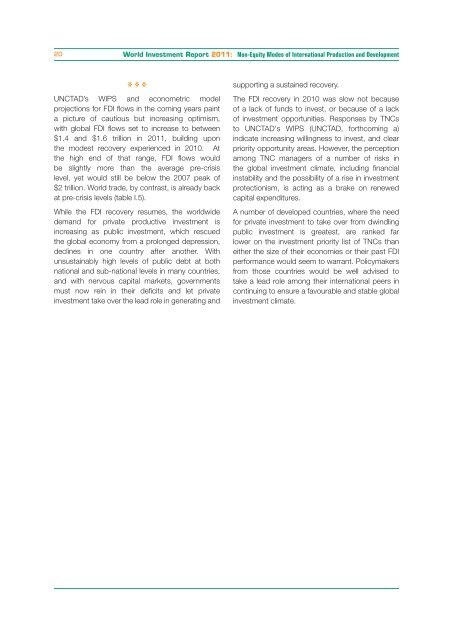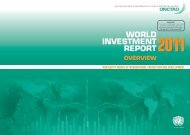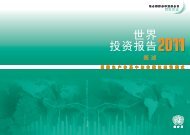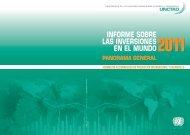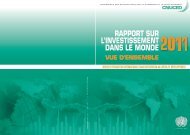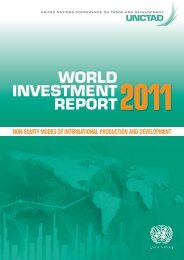CHAPTER I Global Investment Trends
CHAPTER I Global Investment Trends
CHAPTER I Global Investment Trends
You also want an ePaper? Increase the reach of your titles
YUMPU automatically turns print PDFs into web optimized ePapers that Google loves.
20<br />
World <strong>Investment</strong> Report 2011: Non-Equity Modes of International Production and Development<br />
* * *<br />
UNCTAD’s WIPS and econometric model<br />
projections for FDI flows in the coming years paint<br />
a picture of cautious but increasing optimism,<br />
with global FDI flows set to increase to between<br />
$1.4 and $1.6 trillion in 2011, building upon<br />
the modest recovery experienced in 2010. At<br />
the high end of that range, FDI flows would<br />
be slightly more than the average pre-crisis<br />
level, yet would still be below the 2007 peak of<br />
$2 trillion. World trade, by contrast, is already back<br />
at pre-crisis levels (table I.5).<br />
While the FDI recovery resumes, the worldwide<br />
demand for private productive investment is<br />
increasing as public investment, which rescued<br />
the global economy from a prolonged depression,<br />
declines in one country after another. With<br />
unsustainably high levels of public debt at both<br />
national and sub-national levels in many countries,<br />
and with nervous capital markets, governments<br />
must now rein in their deficits and let private<br />
investment take over the lead role in generating and<br />
supporting a sustained recovery.<br />
The FDI recovery in 2010 was slow not because<br />
of a lack of funds to invest, or because of a lack<br />
of investment opportunities. Responses by TNCs<br />
to UNCTAD's WIPS (UNCTAD, forthcoming a)<br />
indicate increasing willingness to invest, and clear<br />
priority opportunity areas. However, the perception<br />
among TNC managers of a number of risks in<br />
the global investment climate, including financial<br />
instability and the possibility of a rise in investment<br />
protectionism, is acting as a brake on renewed<br />
capital expenditures.<br />
A number of developed countries, where the need<br />
for private investment to take over from dwindling<br />
public investment is greatest, are ranked far<br />
lower on the investment priority list of TNCs than<br />
either the size of their economies or their past FDI<br />
performance would seem to warrant. Policymakers<br />
from those countries would be well advised to<br />
take a lead role among their international peers in<br />
continuing to ensure a favourable and stable global<br />
investment climate.


